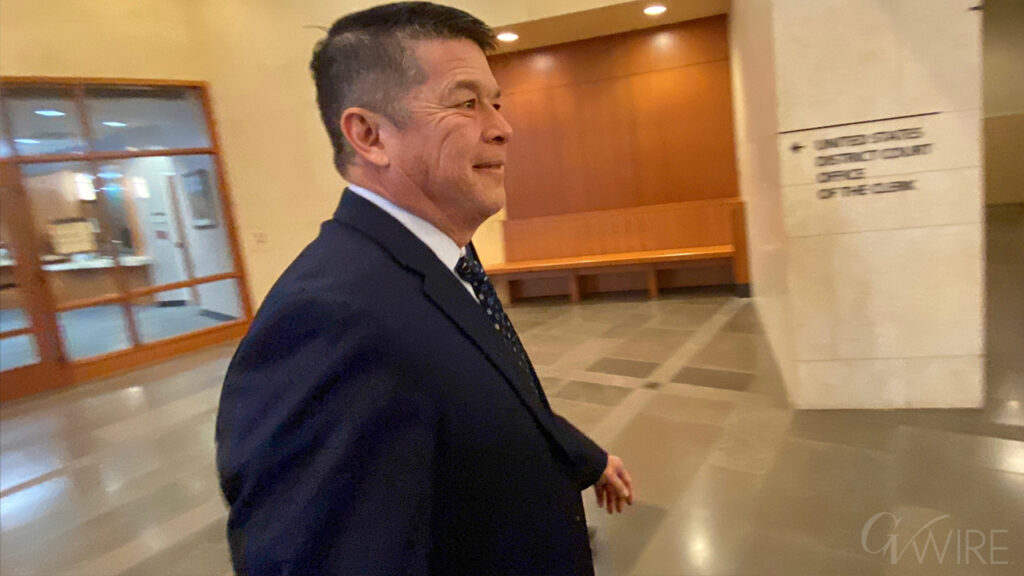Cattle graze on a farm in Dupuyer, Montana., May 13, 2025. Senators opposed the President Donald Trumps plan to import beef from Argentina and voted three times last week to end his power to enforce sweeping tariffs. (The New York Times/John Stember/File)

- There is growing Republican opposition to President Donald Trump's tariffs.
- “These new taxes in the form of tariffs don’t just fail on economics. They fail on the Constitution, and must be reversed,” says Sen. Rand Paul.
- Sen. Mitch McConnell contends the president’s trade war had harmed car manufacturers, farmers, and bourbon distillers in Kentucky.
Share
|
Getting your Trinity Audio player ready...
|
WASHINGTON — Three times last week, the Senate voted to deny President Donald Trump the power to enforce tariffs he has imposed since taking office in January, with a few Republicans joining Democrats in votes that reflected growing resistance in his own party to his trade policies.
The action was symbolic, since the measures have little chance of advancing in the House and no chance of being signed into law by Trump. But behind the scenes, Republicans were pressing for a very real reversal by the president. In a closed-door luncheon with Vice President JD Vance, several of them lobbied for the administration to abandon a plan to increase imports of Argentine beef.
Republicans in Congress have marched almost in lockstep with the president’s foreign and domestic policy agenda. But taken together, the votes to end his tariffs and the private confrontation with the vice president indicated growing angst in the GOP over the impact Trump’s trade agenda is having on constituents.
Vance had been dispatched to Capitol Hill to urge his former Senate colleagues to vote against the trio of resolutions, all of which would terminate the emergencies Trump declared to justify levying tariffs on trading partners across the globe.
Related Story: Supreme Court Won’t Stop Trump’s Tariffs. Deal With It, Officials ...
Ranchers Voice Their Frustration With Trump
Instead, the vice president found himself in a heated discussion with Republican senators from major cattle-producing states over the administration’s plan to quadruple the amount of beef from Argentina allowed into the United States each year, at a lower tariff rate. The move is a bid to bring down the cost of beef after prices rose in recent years. But it has enraged ranchers, a key Republican constituency.
Sen. Ted Cruz, R-Texas, called it a “frank and vigorous conversation,” innocuous words often used by members of Congress to characterize a far more intense and angry discussion.
His fellow Texas Republican, Sen. John Cornyn, said that GOP lawmakers “don’t want to advantage any sort of foreign imports over our domestic production or make it unaffordable to American producers.”
He added, “I think the vice president received the message, and I’m sure will deliver it.”
Hours later, a resolution to end Trump’s 50% tariffs on Brazil passed with bipartisan support.
The following evening, the Senate voted 50-46 to end some of his tariffs on Canada. And Thursday, Republicans crossed party lines to help pass a third resolution, 51-47, to rescind the president’s global tariff rate on more than 100 trading partners.
The majority of Republicans have said they support Trump’s trade policies, arguing that even if they cause temporary discomfort, the tariffs will ultimately reshape the global economy to be more fair to American farmers, manufacturers and business owners.
Sen. John Hoeven, R-N.D., who opposed the resolutions, acknowledged that farmers were “very concerned and having a hard time” but said that he believed the president’s moves would pay off.
“All along, President Trump has been working to get us better trade deals and more sales for our guys. I think that’s what we’ve been anticipating, and it’s not an easy process,” he added.
Related Story: Trump’s Furniture Tariffs Hit Importers in Latest Trade Salvo
Is Trump’s Tariffs Policy Deeply Flawed?
But other Republicans say the pain is a clear sign that Trump’s policy is deeply flawed. Sen. Mitch McConnell, R-Ky., the former party leader, voted for all three anti-tariff measures this week, arguing that the president’s trade war had harmed car manufacturers, farmers and bourbon distillers in his state.
“Consumers are paying higher prices across the board as the true costs of trade barriers fall inevitably on them,” he said in a statement.
He added, “Protectionists in Washington insist that the past several months have vindicated the policy of indiscriminate trade war against both close allies and strategic adversaries. But Kentuckians are especially well equipped to sort the bluster from the truth.”
Sen. Susan Collins, R-Maine, who also crossed party lines to back the resolutions, warned in a recent letter to Howard Lutnick, the commerce secretary, and Jamieson Greer, the U.S. trade representative, that Trump’s 50% tariff rate on steel and aluminum had “exacerbated” the challenges facing lobstermen in her state, raising the price of “nearly all equipment that lobstermen use, including traps, clips, rings and hoops.”
Sen. Tim Kaine, D-Va., who sponsored the three tariff resolutions, said the vice president’s trip to Capitol Hill was a sign that the White House knew “that his own side is getting really worried” about the pain the tariffs had caused.
“They don’t send the VP up,” Kaine added, “unless the White House is really worried. The VP came up to corral them, which is how the VP gets used. And there were still five defectors.”
Related Story: US Cattle Ranchers, Soybean Farmers Are Fed Up With Trump
Tariffs Are Taxes: Sen. Rand Paul
Those defectors were Sens. Rand Paul of Kentucky, the sole Republican to sponsor the three measures to end the tariffs, as well as McConnell, Collins and Lisa Murkowski of Alaska, who voted for all of them.
Sen. Thom Tillis, R-N.C., also backed the resolution to scrap the tariffs on Brazil. The United States has a trade surplus with Brazil, and the tariffs the president imposed amounted to political retaliation against the current government for prosecuting Jair Bolsonaro, his ally and the country’s former president, for an attempted coup. Tillis called the Brazil tariffs “arbitrary” and said they created uncertainty for U.S. manufacturers and consumers.
The Senate’s action came just as Trump struck a trade agreement with China’s leader, Xi Jinping, that would end a Chinese boycott on U.S. soybeans and other farm products. But the agreement, whose details have yet to be made public and which appeared to involve a relatively small number of soybean purchases, did little to allay the concerns from some Republicans about the potential harm the president’s approach could do to their producers.
The Constitution vests the power to levy taxes in Congress, and “tariffs are taxes,” Paul said this week, adding that they drove up the cost of everyday goods for Americans.
“These new taxes in the form of tariffs don’t just fail on economics. They fail on the Constitution, and must be reversed,” he said.
This article originally appeared in The New York Times.
By Megan Mineiro/John Stember
c.2025 The New York Times Company
RELATED TOPICS:
Categories

Fresno County Firefighters Contain Reedley House Fire


















